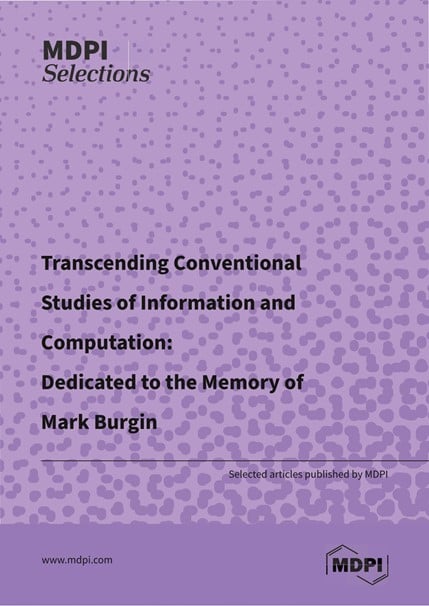MDPI Selections | Transcending Conventional Studies of Information and Computation: Dedicated to the Memory of Mark Burgin
|
|
Preface to Transcending Conventional Studies of Information and Computation: Dedicated to the Memory of Mark Burgin: This book stands as a tribute to the memory of our late colleague, Professor Mark Burgin, whose recent departure has left a profound void in our academic community. Within the pages of this volume, we present a collection of reprints featuring Professor Burgin’s articles, previously published in MDPI venues, including journals Information, Entropy, Philosophies, Big Data and Cognitive Computing, and Proceedings. Mark Burgin was a highly respected figure in the academic world, renowned for his exceptional contributions as a mathematician, computer scientist, and information theoretician. His profound impact resonated across a diverse spectrum of fields, encompassing the domains of information and computation, foundations of mathematics, philosophy of information and computation, theory of knowledge, and logic. |
Professor Burgin’s intellectual prowess and groundbreaking research have left an indelible mark on numerous scholarly endeavors, offering novel insights into information-based phenomena. Through his interdisciplinary approach, he bridged gaps between disparate disciplines, instigating fresh connections, approaches, and applications that have profoundly enriched the advancement of these specialized domains.
With this volume, we pay homage to the enduring legacy of Mark Burgin, commemorating his remarkable career and intellectual achievements. It is our aspiration that this compendium shall serve as a testament to his invaluable contributions and will inspire future generations of scholars to engage in rigorous research within the very fields that were enriched by his exceptional scholarship.
Gordana Dodig-Crnkovic and Marcin Schroeder
The following is a selection of papers by Prof. Mark Burgin:
“Information Theory: a Multifaceted Model of Information”
Entropy 2003, 5(2), 146-160; https://doi.org/10.3390/e5020146
“Information Operators in Categorical Information Spaces”
Information 2010, 1(2), 119-152; https://doi.org/10.3390/info1020119
“Epistemic Information in Stratified M-Spaces”
Information 2011, 2(4), 697-726; https://doi.org/10.3390/info2040697
“Evolutionary Information Theory”
Information 2013, 4(2), 124-168; https://doi.org/10.3390/info4020124
“Weighted E-Spaces and Epistemic Information Operators”
Information 2014, 5(2), 357-388; https://doi.org/10.3390/info5020357
“Prolegomena to Information Taxonomy”
Proceedings 2017, 1(3), 210; https://doi.org/10.3390/IS4SI-2017-04035
“The General Theory of Information as a Unifying Factor for Information Studies: The Noble Eight-Fold Path”
Proceedings 2017, 1(3), 164; https://doi.org/10.3390/IS4SI-2017-04044
“Structural and Symbolic Information in the Context of the General Theory of Information
Information 2017, 8(4), 139; https://doi.org/10.3390/info8040139
“Structures and Structural Information”
Proceedings 2017, 1(3), 217; https://doi.org/10.3390/IS4SI-2017-04036
“A Dialogue Concerning the Essence and Role of Information in the World System”
Information 2020, 11(9), 406; https://doi.org/10.3390/info11090406
“Discerning Potential and Impact Information”
Proceedings 2020, 47(1), 4; https://doi.org/10.3390/proceedings2020047004
“World Structuration and Ontological Information”
Proceedings 2022, 81(1), 93; https://doi.org/10.3390/proceedings2022081093
“Physical Facets of Information, Information Materialization or the Grand Illusion”
Proceedings 2022, 81(1), 76; https://doi.org/10.3390/proceedings2022081076
“Is Information Physical and Does It Have Mass?”
Information 2022, 13(11), 540; https://doi.org/10.3390/info13110540
“Unconventional Algorithms: Complementarity of Axiomatics and Construction”
Entropy 2012, 14(11), 2066-2080; https://doi.org/10.3390/e14112066
“Prolegomena to an Operator Theory of Computation”
Information 2020, 11(7), 349; https://doi.org/10.3390/info11070349
“Structural Connections: Algorithms as Rituals and Rituals as Algorithms”
Proceedings 2022, 81(1), 3; https://doi.org/10.3390/proceedings2022081003
“Processing Information in the Clouds”
Proceedings 2020, 47(1), 25; https://doi.org/10.3390/proceedings2020047025
“Structural Machines as Unconventional Knowledge Processors”
Proceedings 2020, 47(1), 26; https://doi.org/10.3390/proceedings2020047026
“Modeling Computing Devices and Processes by Information Operators”
Proceedings 2020, 47(1), 18; https://doi.org/10.3390/proceedings2020047018
“Information Processing by Symmetric Inductive Turing Machines”
Proceedings 2020, 47(1), 28; https://doi.org/10.3390/proceedings2020047028
“Triadic Automata and Machines as Information Transformers”
Information 2020, 11(2), 102; https://doi.org/10.3390/info11020102
“From data Processing to Knowledge Processing: Working with Operational Schemas by Autopoietic Machines”
Big Data Cogn. Comput. 2021, 5(1), 13; https://doi.org/10.3390/bdcc5010013
“Designing New Forms of Digital Autopoietic Machines”
Proceedings 2022, 81(1), 59; https://doi.org/10.3390/proceedings2022081059
“Information Processing by Selective Machines”
Proceedings 2022, 81(1), 122; https://doi.org/10.3390/proceedings2022081122
“Problem-Oriented Foundations of Intelligence in the Context of Superintelligence”
Proceedings 2020, 47(1), 21; https://doi.org/10.3390/proceedings2020047021
“Three Approaches to Artificial Intelligence”
Proceedings 2022, 81(1), 147; https://doi.org/10.3390/proceedings2022081147
“Relational Structure of Conceptual Spaces”
Proceedings 2022, 81(1), 39; https://doi.org/10.3390/proceedings2022081039
“Operations with Nested Named Sets as a Tool for Artificial Intelligence”
Big Data Cogn. Comput. 2022, 6(2), 37; https://doi.org/10.3390/bdcc6020037
“Knowledge Processing as Structure Transformation”
Proceedings 2017, 1(3), 212; https://doi.org/10.3390/IS4SI-2017-03988
“Operators in Nature, Science, Technology, and Society: Mathematical, Logical, and Philosophical Issues”
Philosophies 2017, 2(3), 21; https://doi.org/10.3390/philosophies2030021
“Problems in the System of Scientific Knowledge”
Proceedings 2017, 1(3), 273; https://doi.org/10.3390/IS4SI-2017-03947
“Principles of General Ecology”
Proceedings 2017, 1(3), 148; https://doi.org/10.3390/IS4SI-2017-03996
“Bidirectional Named Sets as Structural Models of Interpersonal Communication”
Proceedings 2017, 1(3), 58; https://doi.org/10.3390/IS4SI-2017-03916
“Information Ecology in the Context of General Ecology”
Information 2018, 9(3), 57; https://doi.org/10.3390/info9030057
“Complexity of Legal Processes and Systems”
Proceedings 2020, 47(1), 17; https://doi.org/10.3390/proceedings2020047017
“Monitoring Thermal Conditions and Finding Sources of Overheating”
Proceedings 2022, 81(1), 38; https://doi.org/10.3390/proceedings2022081038
“Named Sets as an Efficient Tool for Modeling Data Relationships in Database Models”
Proceedings 2022, 81(1), 51; https://doi.org/10.3390/proceedings2022081051
“Symbiotic Information Processing and Technological Progress”
Proceedings 2022, 81(1), 84; https://doi.org/10.3390/proceedings2022081084
“Pollution Information Acquisition and Discovering Pollution Sources”
Proceedings 2022, 81(1), 74; https://doi.org/10.3390/proceedings2022081074
“Symposium Theoretical Information Studies”
Proceedings 2017, 1(3), 223; https://doi.org/10.3390/proceedings1030223
“IS4SI SUMMIT Berkeley 2019”
Proceedings 2020, 47(1), 1; https://doi.org/10.3390/proceedings2020047001
“Conference Theoretical Information Studies Berkeley 2019”
Proceedings 2020, 47(1), 2; https://doi.org/10.3390/proceedings2020047002
“Recent Books Delineating the Emergent Academic Filed of the Study of Information”
Proceedings 2020, 47(1), 6; https://doi.org/10.3390/proceedings2020047006
“2021 Summit of the International Society for the Study of Information (IS4SI)”
Proceedings 2022, 81(1), 1; https://doi.org/10.3390/proceedings2022081001
“Conference Theoretical and Foundational Problems in Information Studies”
Proceedings 2022, 81(1), 32; https://doi.org/10.3390/proceedings2022081032
